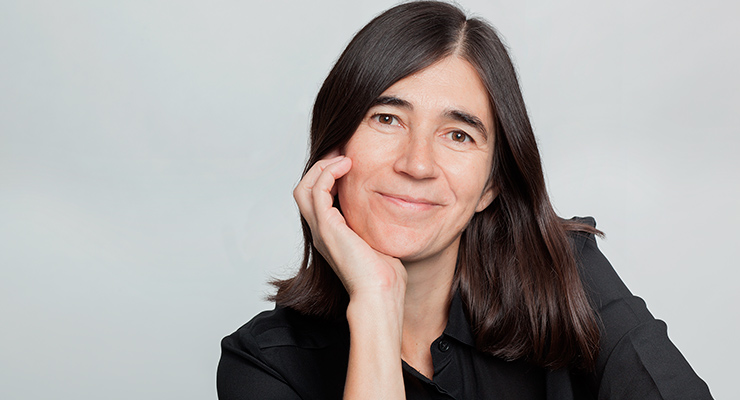Brenda Cooperstone is a trailblazer in medical research. After starting out as a practicing physician, she made a bold career move and joined the pharmaceutical company Pfizer, where she now holds a unique position: heading programs to find treatments for patients who previously had little hope. All of this has stemmed from her lifelong passion to “make a difference in the world.” And the fact that she’s working in a field dominated by men makes her accomplishments even more remarkable: She is honored on World Woman Hour as one of the 60 women leading change in scientific research.
Brenda is Pfizer’s Chief Development Officer for Rare Diseases. Although they are termed “rare,” there are in fact over 7,000 known rare diseases, which together affect about 400 million people worldwide. So the potential for impact is great. Only 5% of known rare diseases have an approved treatment to date. The vast majority of people suffering from them have had no solutions they could turn to. Brenda’s mission is to help change their lives for the better, and as her interview with World Woman Hour shows, her work has taken some unexpectedly personal turns.

Brenda is also a determined advocate for women’s empowerment when it comes to how we show up in the workplace—no emotions barred! This extends to giving ourselves permission to feel and be our truest selves—from the lab to the board room. Here are the highlights of a conversation filled with passion and joy.
Q: Could you tell us a bit more about the journey that led to your present role?
Brenda: Ever since I was a little girl, I wanted to be a doctor. I became a specialist in pediatric neurology and I loved that job. It was wonderful getting to play with the kids I saw, getting to know their families, and really feeling like I was making a difference. Then I had the opportunity to expand on that, from helping kids and their families one at a time to helping people by the thousands. That’s why I chose to ultimately work in the pharmaceutical industry. Each rare disease may impact a few patients but collectively there are many, many different patients, all of whom still have unmet needs. I am driven to look for treatments that will make a difference for them.
Q: And is it correct to say that this work became intensely personal for you?
Brenda: Yes. While we were working on one medicine for a rare disease, the information that I learned helped me and my family to understand that my father had the symptoms of that same disease. It’s a rare form of cardiomyopathy [which attacks the muscle tissue of the heart]. Because of that discovery, we were able to help bring him to that diagnosis and care. . It still makes me emotional just thinking about it.
So I understand acutely the difference that this work can make. I can see it in my dad, who just celebrated his 85th birthday. And now, in all the work I do, I see my father in every other patient that I’m working for in the rare disease space, I know that I, and everybody working with me, made a difference for my family, and I hope so strongly that I get to make that difference for other families, just like ours.
Q: Could you share a key lesson you’ve learned in the course of your journey?
Brenda: I learned this from a mentor when I entered the pharmaceutical industry: Embrace your mistakes. When people blame you for things that go wrong, it means you’re empowered. It means you are responsible, so now you can say “Get out of my way, I’m going to fix this.” And then if you do, you’ll be remembered not for the mistakes, but for those successes.
Here is one example that comes to mind. At Pfizer, we took a particular medicine into clinical trials, and given our knowledge at that point, the trial probably wasn’t designed in the best way. We failed to get that drug over the finish line for FDA approval. But I believed in the science behind it. I believed it could work. So I felt empowered to push hard to try again,that led to a program that was probably the most successful in my career. We’re now able to bring that medicine to patients who finally have a treatment that will make their lives better and allow them to live longer.
Q: You are a woman in a position of extraordinary leadership in a very difficult field that’s male-dominated. What changes could be made within the healthcare field to have more women leading effectively?
Brenda: Some excellent advancements have already begun, in the way that we approach work-life balance and the accommodations that are made when necessary within the workplace. But, more change has to stem from where the leadership is today — which is predominantly male. Working on how men can become allies is every bit as important, if not more important, than teaching women how to interact and act. I think that change will happen with time and with new generations. And I can say my biggest contribution to that change is bringing up two sons who see women as powerful and more than equal.
Let me tell a story about my oldest son, who’s now 28. When he was about seven or eight, we moved to a different neighborhood and I was taking him to see a new pediatrician. His previous pediatricians had been women, and he knew his mom was a doctor, but this time I had chosen a male doctor for him. We’re sitting in the examining room when the pediatrician walks in. I introduce him to my son, who looks at the man and then turns to me with a look of confusion on his face. He says “Mommy! Doctors can’t be boys!”
It really struck me that it’s what you see, and what you live with, that colors your perception.
Q: Is there something that you wish you knew or had been told when you were starting out as a young woman in the medical profession?
Brenda: I wish somebody had told me that it was okay to be myself. A lot of advice that I got early in my career was about fitting into a mold, and maybe being different than I actually am. Now that I feel like I have a little more luxury to be comfortable with who I am, I want to make other people comfortable. Especially other women. I want them to know that if you’re moved by something, it’s okay to cry, and if something is really funny, it’s okay to laugh out loud.
In most fields, women are made to feel that they need to suppress their emotions—that they always need to look like they’re ‘put together.’ But a show of emotion, whether male or female, is actually so much more than just an emotional moment. It’s an expression of who you really are. It’s like taking back your power.
Q: Any parting thoughts for our audience?
Brenda: I believe that we women can do anything. I see no limitations. In fact, I think that being a woman, and having all the aspects that make us female, helps to propel us forward. We should all take advantage of that. We have the responsibility to bring it forward for the betterment of everybody. Keeping it to ourselves, or holding ourselves back from leadership and from opportunities, is not the right thing for anybody. We need to live it!


















I have been exploring for a little bit for any high quality articles or blog posts on this sort of area . Exploring in Yahoo I at last stumbled upon this website. Reading this info So i am happy to convey that I’ve a very good uncanny feeling I discovered just what I needed. I most certainly will make certain to don’t forget this website and give it a glance regularly.
F*ckin’ awesome issues here. I’m very glad to see your post. Thank you a lot and i am taking a look forward to contact you. Will you please drop me a mail?
As a Newbie, I am continuously searching online for articles that can help me. Thank you